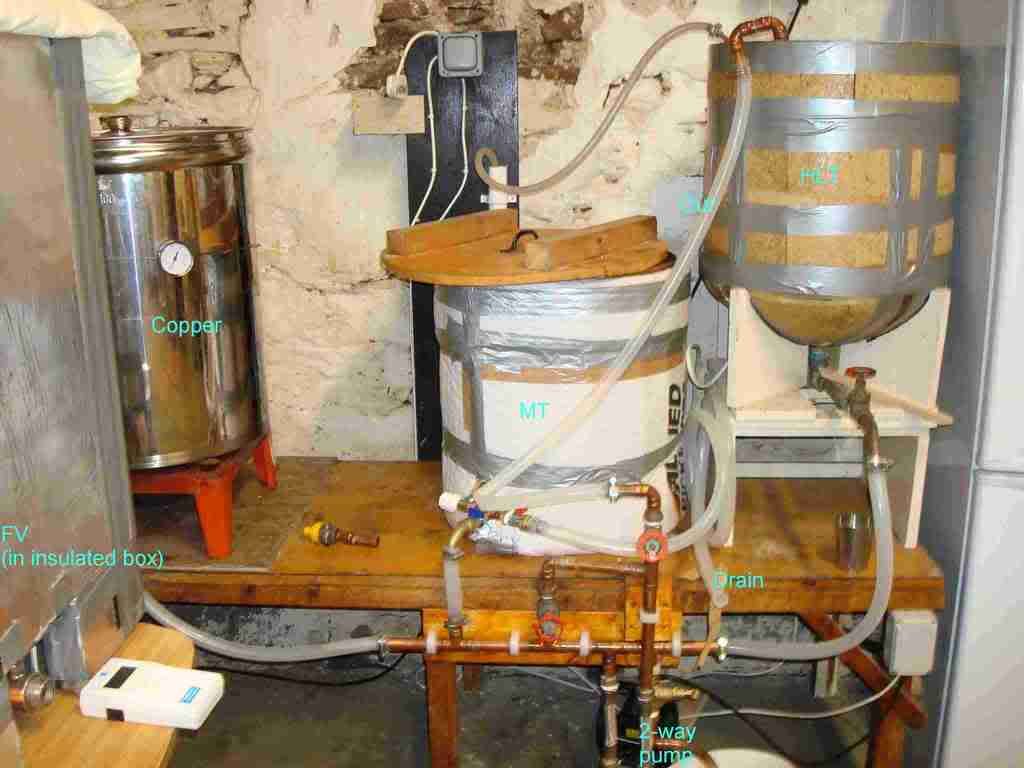Page 1 of 1
Hen's tooth & underletting
Posted: Thu May 29, 2008 7:10 pm
by MDE
Just tried making a Hen's Tooth clone (the wife is particularly partial to it) from DaaB's recipe and some dregs from a couple of bottles. Thought I'd try a new mashing/sparging method, just because I can with my shiny new pump. Underletting is a really neat way of mashing in - no splashing and the water comes in at the right speed for mixing in the grains. Just a couple of points to remember:
(a) There is less heat loss than splashing the water in from above, so the liquor temperature needs to be a fraction lower than usual.
(b) If you don't turn the tap off before you go away for a well-earned cup of coffee, water may still siphon over after the pump is turned off - slowly, silently, but inexorably

. How embarrassing this is depends on the water level in the HLT and the height of the rim of your mash tun. In my case it stopped about 1 inch below the top of the MT, so no huge disaster, but a rather more dilute and hotter mash than had been planned!
Underletting is also a neat method of batch sparging and seemed to result in a less "set" mash than pouring the water in on top. Still less efficient than fly-sparging though. With all the experimentation and mistakes, the extract ended up below target, so I added a bit of sugar. God knows what it will taste like.
Posted: Thu May 29, 2008 7:21 pm
by edit1now
Could you do a sketch showing the plumbing please?
Posted: Fri May 30, 2008 9:24 am
by MDE
No sketch, but here's a pic

The pump is reversible, so that the "out" pipe - the vertical one - can become an "in" pipe. Since the pump is self-priming, this means that liquor can be sucked up from the copper or HLT and pumped into the bottom outlet of the MT - i.e underletting.
BTW the MT has a tee on the outlet, enabling wort to be directed to the pump (for recirculation, optionally via a heat exchanger in the HLT) or drained to the underback (i.e. plastic bucket). Changing the tap settings then enables wort to be sucked out of the underback and into the copper. With this many taps, you can see how I left one open by mistake.
Seems like this is becoming more of an "equipment" than a "brewday" thread.
Posted: Fri May 30, 2008 8:10 pm
by edit1now
Nice one!
Re: Hen's tooth & underletting
Posted: Fri May 30, 2008 8:52 pm
by Gurgeh
MDE wrote:Just a couple of points to remember:
(a) There is less heat loss than splashing the water in from above, so the liquor temperature needs to be a fraction lower than usual.
(b) If you don't turn the tap off before you go away for a well-earned cup of coffee, water may still siphon over after the pump is turned off - slowly, silently, but inexorably

. How embarrassing this is depends on the water level in the HLT and the height of the rim of your mash tun. In my case it stopped about 1 inch below the top of the MT, so no huge disaster, but a rather more dilute and hotter mash than had been planned!
Underletting is also a neat method of batch sparging and seemed to result in a less "set" mash than pouring the water in on top. Still less efficient than fly-sparging though. With all the experimentation and mistakes, the extract ended up below target, so I added a bit of sugar. God knows what it will taste like.
This is true and i have done it too. I fear that you may soon discover:
(c) sparge water has managed to find a way of bypassing mash, meaning that you have to recirc all of your wort through the mash and still fish out a bag of DME from the back of the cupboard

still - that was the kolsch i made and it was all gone within 10 days of being ready (not all down my own throat)


Posted: Sat May 31, 2008 11:05 am
by Horden Hillbilly
Good looking set up mde, nice one!

Posted: Thu Jun 26, 2008 9:42 am
by MDE
Drinking the beer now, it is a very good imitation of Hen's Tooth. I presume that this is mostly due to using yeast from a bottle. However it did give me some worrying moments as it took ages to ferment and there was quite a bit of diacetyl at one stage. Also the yeast is quite flocculant and "loose" - very much a top-fermenter. I roused it once, which may have helped.
 . How embarrassing this is depends on the water level in the HLT and the height of the rim of your mash tun. In my case it stopped about 1 inch below the top of the MT, so no huge disaster, but a rather more dilute and hotter mash than had been planned!
. How embarrassing this is depends on the water level in the HLT and the height of the rim of your mash tun. In my case it stopped about 1 inch below the top of the MT, so no huge disaster, but a rather more dilute and hotter mash than had been planned!